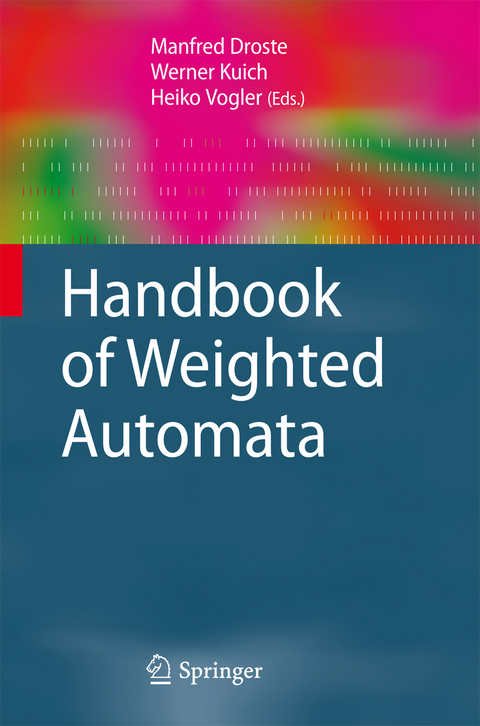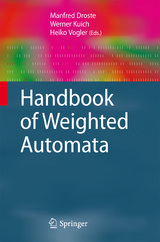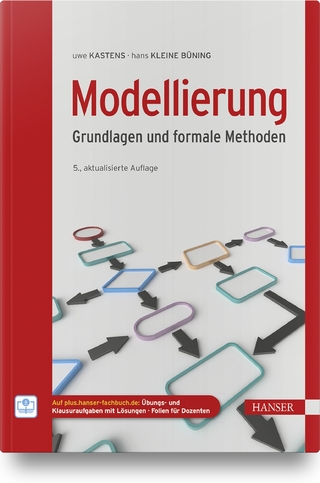Handbook of Weighted Automata
Springer Berlin (Verlag)
978-3-642-01491-8 (ISBN)
Part I, Foundations: Semirings and Formal Power Series.- Fixed Point Theory. Part II, Concepts of Weighted Recognizability: Finite Automata.- Rational and Recognisable Power Series.- Weighted Automata and Weighted Logics.- Weighted Automata Algorithms. Part III, Weighted Discrete Structures: Algebraic Systems and Pushdown Automata.- Lindenmayer Systems.- Weighted Tree Automata and Tree Transducers.- Traces, Series-Parallel Posets, and Pictures: A Weighted Study. Part IV, Applications: Digital Image Compression.- Fuzzy Languages.- Model Checking Linear-Time Properties of Probabilistic Systems.- Applications of Weighted Automata in Natural Language Processing. Index.
From the reviews:
"This book is an excellent reference for researchers in the field, as well as students interested in this research area. The presentation of applications makes it interesting to researchers from other fields to study weighted automata. ... One of the main arguments in favor of this handbook is the completeness of its index table - usually a faulty section in such volumes. The chapters are globally well-written and self-contained, thus pleasant to read, and the efforts put to maintain consistency in vocabulary thorough the book are very appreciable." (Michaël Cadilhac, The Book Review Column 43-3, 2012)
"The book presents a broad survey, theory and applications, of weighted automata, classical nondeterministic automata in which transitions carry weights. ... The individual articles are written by well-known researchers in the field: they include extensive lists of references and many open problems. The book is valuable for both computer scientists and mathematicians (being interested in discrete structures)." (Cristian S. Calude, Zentralblatt MATH, Vol. 1200, 2011)
From the reviews:"This book is an excellent reference for researchers in the field, as well as students interested in this research area. The presentation of applications makes it interesting to researchers from other fields to study weighted automata. ... One of the main arguments in favor of this handbook is the completeness of its index table — usually a faulty section in such volumes. The chapters are globally well-written and self-contained, thus pleasant to read, and the efforts put to maintain consistency in vocabulary thorough the book are very appreciable." (Michaël Cadilhac, The Book Review Column 43-3, 2012)“The book presents a broad survey, theory and applications, of weighted automata, classical nondeterministic automata in which transitions carry weights. … The individual articles are written by well-known researchers in the field: they include extensive lists of references and many open problems. The book is valuable for both computer scientists and mathematicians (being interested in discrete structures).” (Cristian S. Calude, Zentralblatt MATH, Vol. 1200, 2011)
| Erscheint lt. Verlag | 28.9.2009 |
|---|---|
| Reihe/Serie | Monographs in Theoretical Computer Science. An EATCS Series |
| Zusatzinfo | XVII, 608 p. 76 illus., 3 illus. in color. |
| Verlagsort | Berlin |
| Sprache | englisch |
| Maße | 155 x 235 mm |
| Gewicht | 1214 g |
| Themenwelt | Mathematik / Informatik ► Informatik ► Theorie / Studium |
| Schlagworte | algorithms • Automat • Automata • Automata Theory • Automatentheorie • Cognition • Digital Image Processing • extension • Finite Automata • formal language • Formal Languages • Formal power series • Logic • Model Checking • natural language • Natural Language Processing • Semirings • Speech Recognition • theoretical computer science • Weighted Automata |
| ISBN-10 | 3-642-01491-7 / 3642014917 |
| ISBN-13 | 978-3-642-01491-8 / 9783642014918 |
| Zustand | Neuware |
| Haben Sie eine Frage zum Produkt? |
aus dem Bereich




